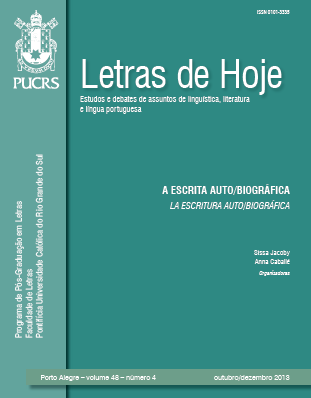On the tradition of memoirs writing in Brazil
Keywords:
Brazilian literature, Memoirs, Literary HistoriographyAbstract
This study presents a reflection on the writing of memoirs in Brazil in an attempt to discuss an assertion by Afrânio Coutinho (1969) about the absence of such a tradition in our country. The analysis presented is based on a sequence of literary works - Memórias (1948), by Visconde de Taunay; Memórias do Cárcere (1953), by Graciliano Ramos; Um homem sem profissão (1954), by Oswald de Andrade; Meus verdes anos (1956), by José Lins do Rego; Solo de Clarineta (1974-1976), by Érico Veríssimo; Navegação de Cabotagem (1992), by Jorge Amado e Quase memória: quase-romance (1995), by Carlos Heitor Cony. The main theoretical background is based on Jacques Le Goff (2003), Alba Olmi (2006) and Anna Caballé (1991). By pointing out the idiosyncrasies of each work in relation to the representation of the past, it is possible to observe a continuous tradition of memoirs writing in the Brazilian literary historiography.
Downloads
Downloads
How to Cite
Issue
Section
License
Copyright
The submission of originals to Letras de Hoje implies the transfer by the authors of the right for publication. Authors retain copyright and grant the journal right of first publication. If the authors wish to include the same data into another publication, they must cite Letras de Hoje as the site of original publication.
Creative Commons License
Except where otherwise specified, material published in this journal is licensed under a Creative Commons Attribution 4.0 International license, which allows unrestricted use, distribution and reproduction in any medium, provided the original publication is correctly cited.






